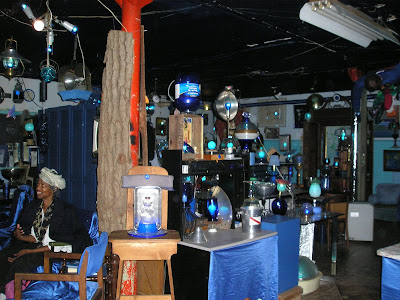My review of Paula Bohince's
Incident at the Edge of Bayonet Woods (Sarabande, 2008) appears in the new issue of
Valparaiso Poetry Review. This collection combines a mystery story and lyricism. What could be more delicious than that? I'm happy to recommend this highly readable and moving collection. To entice you, here are the first two paragraphs of my review:
"Paula Bohince’s
Incident at the Edge of Bayonet Woods is a stunning debut. Both a mystery and a lyric tour de force, the collection immediately takes a choke hold on the reader’s attention and never releases its grip. Poem by poem, Bohince unravels her dark story. In Section I we learn that the setting is a lonely rural farm located in the coal-mining country of Pennsylvania. Primitive and shadowed by history, the farm is characterized by mud, grime, cold winters, and poverty. The female speaker, following her father’s grisly murder, returned to this farm where she was raised, to live there and to claim her legacy of loneliness. In the poems, she struggles to get to know her father and to make sense of his life and death. Recalling the farm as it was years ago, she says, “I taste the odor of straw and millet released into fall, / the cursive of my father’s burning cigarette, / muslin curtain parting.” Thus, the stage is prepared for the father’s entry and the mystery’s unfolding.
"While Section II introduces the suspected murderers and suggests a motive, Bohince deliberately leaves the narrative incomplete, a strategy that works well to pique and hold our interest. The motive is never more than speculation. The suspects remain merely suspects. There is no real solution to the crime. As our speaker attempts to reconstruct a story she does not fully know, she moves back and forth between present and past, affording us the pleasure of finding clues and reconstructing the story ourselves. As she tries to remember events from her childhood, she must acknowledge the fallibility of memory. In “Landscape with Sheep and Deer,” she says, “I must have dreamt it,” and she wonders, “. . . if there were deer, wouldn’t they have leapt over?” Bohince subtly places us in that oddly delicious and ironic spot of uncertainty."
. . .the rest of the review.
To further entice you to get your hands on this collection, here are two of my favorite poems. The first, a kind of prayer, is spoken in the collective voice of the women of Bayonet Woods. Bohince does a beautiful job of characterizing the loneliness of the setting. We sense a place haunted by ghosts.
Spirits at the Edge of Bayonet WoodsCrabgrass thickens, and catalpas bloom
gigantic, hoping to hide our homestead, the poverty
and grime that kept us mired here
for generations, as if we were sleeping
off a bender for one hundred years.
Sooty hankies against our mouths, in the kitchen
chicken spitting in the fryer,
thick smoke rising, and we’re in the mineshafts,
the ones that swallowed our men
and cooked them and spat them into our beds.
Forgive us, Lord, we did not know them,
humpbacked and ruined, crawling toward us
wanting clean shirts, kisses, more children.
Tell us, what was a woman’s purpose in those woods?
Trading quails’ eggs for the babies’ medicine,
boiling lye and animal grease to shampoo coal dust
from our men’s curling hair?
They clung to us in sleep, that watery place,
and we swear, as we lay beside our own husbands,
we did not know them, even as they struck us,
muttering terrors, whimpering the struggle
of slowly drowning in a shaft flood, or burning
alive in a coke fire. And though we pitied Grace,
the valley’s only suicide, we understood
when she wrote,
I cannot go on here, in this place…In fact, we watched her strip beside Stone Path
where she had gone to pray, faithful to the current’s
constant swirling, watched her weep beside
the river’s illiterate banks, lay her dress upon
its slick grasses, wade into the inch of loam,
then lie facedown in its merciful pull.
Forgive her, Lord, for leaving this earth so early.
She was terribly lonely.
This next poem is one of four acrostics in the collection. The speaker addresses her dead father in this elegant and poignant poem.
Acrostic for My FatherI can't bear the pitiful beauty of our only oak
declining in these ill-lit woods, masculine branches bearing
robins, savage in their redness.
Everything becomes a version of you,
assumes a fern or bird shape, some feathery thing I put want into.
My days are colored by your absence, or left blank,
open-ended. I fill my eyes with reminders.
Fronds I refuse to weed line the house, this lonely house
you left me. The rest of my life you have left me.
Oak leaves fill with crumbling light. So I,
undone by the quiet.
































